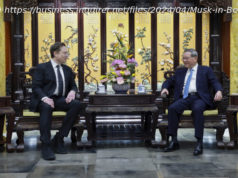BEIJING — In a meeting with Beijing municipal officials in the fall of 2017, Chinese President Xi Jinping made what could have seemed like an…
BEIJING — In a meeting with Beijing municipal officials in the fall of 2017, Chinese President Xi Jinping made what could have seemed like an offhand remark.
Mr. Xi observed that Beijing’s skyline was dominated by neon signs and billboards. The tops of office buildings, hotels, hospitals, and apartment buildings throughout the capital are festooned with them, giving the capital city what the president called a “crowded” look.
He did not make a specific request or issue a diktat — he didn’t need to. The Beijing municipal government got the message, and announced that all signs on buildings taller than three stories would need to be removed — nearly 20,000 of them. Within weeks, the offending edifices disappeared.
The solution caused problems of its own — locals complained that, in a city of monotonous colonies of identical apartment buildings, they relied on the signs to tell which building was theirs. But the concerns were swept aside when the president decided China’s capital should have a tidier skyline.
“Tidy” is not traditionally a word one would associate with Beijing, a sprawling megacity of 21.5 million long characterized by air pollution, traffic and oppressive crowds.
Yet while still a far cry from the orderly (some would say oppressive) state of a Tokyo or Singapore, Beijing has been transformed in the last decade, a tribute to the efficacy of the country’s authoritarian political system, if not its respect for basic human rights or liberties.
Clearing the air
Beijing, set on a sprawling plain ringed by mountains on three sides, has for decades been beset by horrific air pollution. The combination of industry, the heavy use of coal, traffic, and basin-like conditions that trap air, combined to make a toxic brew, so dangerous that going outside on many days was deemed a health hazard.
At its nadir, barely a decade ago, the haze was so thick that flights had to occasionally be canceled. Foreign executives assigned to Beijing demanded hazard pay. When Beijing hosted the Summer Olympics in 2008, the government ordered local factories to shut down for weeks before and during the games to ensure blue skies and healthy conditions for athletes and spectators.
Beginning in 2013, the year after Mr. Xi assumed the presidency, the city began to get serious about reducing pollution on a more systemic level. It did so in classic contemporary Chinese fashion: with an emphasis on results.
The story of the chuan’r salesmen is one example.
For decades, a staple of any Beijing neighborhood was the local chuan’r monger, selling a Chinese-style kabob. The open-air chuan’r stands were a popular place to have a few beers and hang out. Many of them set up plastic tables and chairs.
In the blink of an eye, however, the chuan’r stands disappeared.
In 2013, local authorities were photographed literally destroying them, with public workers seizing and shredding the barbecues on municipal orders.
Start
United States
USA — China Xi Jinping taps unspoken authority to transform Beijing into a 'tidy' city






